Nation remembers Ruth Bader Ginsburg
Credit: AP/The DePaulia
People gather at the Supreme Court to honor the late Justice Ruth Bader Ginsburg, Saturday, Sept. 19, 2020, in Washington. (AP Photo/Cliff Owen)
Supreme Court Justice Ruth Bader Ginsburg, known for her groundbreaking strides in women’s rights, died Friday at 87, the Supreme Court announced. The second woman to be appointed to the Supreme Court, Ginsburg’s reputation echoes in the heartfelt condolences and open criticisms of the public while the political implications of her death add uncertainty to an already turbulent election year.
The court said the cause of death was complications from metastatic pancreas cancer. According to the statement, Ginsburg died at her home in Washington, surrounded by family.
“Our Nation has lost a jurist of historic stature. We at the Supreme Court have lost a cherished colleague,” Chief Justice John Roberts said of Ginsburg. “Today we mourn, but with confidence that future generations will remember Ruth Bader Ginsburg as we knew her — a tireless and resolute champion of justice.”
Ruth Bader Ginsburg, born in 1933, grew up in a middle-class family in Brooklyn, New York. She was affectionately nicknamed “Kiki” by her older sister, who died at age 6.
Ginsburg started at Harvard Law School but transferred to Columbia when her husband got a job there. In 1959, she finished at the top of her class, but was unable to find a law firm that would hire her because she was a woman.
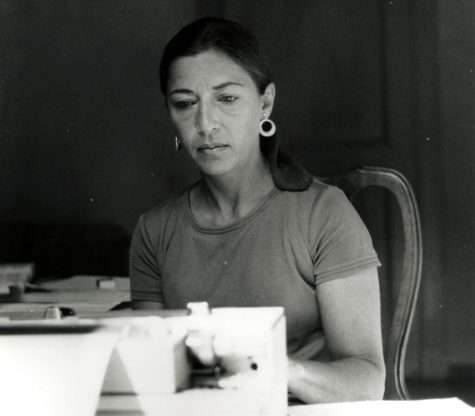
At 17-years-old, Ginsburg met her husband, Martin, at Cornell University. They married in 1954 and are survived by two children, Jane and James. Martin Ginsburg became a prominent tax attorney and law professor. He died in 2010 because of complications from metastatic cancer.
Affectionately nicknamed “the Notorious RBG,” Ginsburg was a fervent advocate of gender equality. She co-founded the American Civil Liberties Union Women’s Rights Project in 1972. As an architect of the project, she led the ACLU in bringing important legal battles to the Supreme Court. The Women’s Rights Project and ACLU affiliates participated in over 300 sex discrimination cases from 1969-1980, paving the way for Ginsburg’s life-long reputation as a resounding voice in the fight for gender equality.
In 1996, Ginsburg wrote the majority opinion for United States v. Virginia, a case about gender-based exclusions at the Virginia Military Institute. The institute was Virginia’s last exclusively-male higher learning institution at the time. In Ginsburg’s argument, she said that it is of the court’s opinion that Virginia violated the 14th Amendment’s Equal Protection Clause. In 1997, the Virginia Military Institute saw a co-ed class for the first time in its 158-year-old history, enrolling 31 women among their class of 430 men.
Ruth Bader Ginsburg, later referred to as “the great dissenter,” delivered powerful dissents on issues of abortion, voting rights and pay discrimination. In an interview with NPR’s Nina Totenberg, Ginsburg said that a dissenter’s hope is that “they are writing not for today, but for tomorrow.”
In the 2006 case, Ledbetter v. Goodyear, Lily Ledbetter sued her employer for gender discrimination on the grounds of receiving lower pay than her male counterparts. Ginsburg wrote the dissenting opinion, accusing the eight male justices of being indifferent to the gender pay gap.
“The Court does not comprehend or is indifferent to the insidious way in which women can be victims of pay discrimination,” Ginsburg said.
In 2009, President Barack Obama signed the Lilly Ledbetter Fair Pay Act into law, requiring employers to ensure pay practices are non-discriminatory and to keep records proving the fairness of pay decisions.
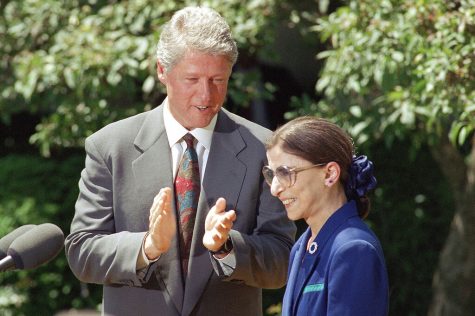
Despite her significant contributions to gender equality, Ginsburg has been criticized for her relationship with racial justice. In Ginsburg’s 13-year tenure in the U.S. Court of Appeals for the District of Columbia Circuit, she did not hire a single Black law clerk. When this issue was raised at Ginsburg’s Supreme Court confirmation hearings in 1993, she said, “If you confirm me for this job, my attractiveness to Black candidates is going to improve.” After serving for 27 years on the bench, Ginsburg only hired one Black clerk.
In a 2016 interview with Katie Couric, Ginsburg openly commented on San Francisco 49ers quarterback Colin Kaepernick for not standing during the national anthem.
“If they want to be stupid, there’s no law that should be preventive. If they want to be arrogant, there’s no law that prevents them from that. What I would do is strongly take issue with the point of view that they are expressing when they do that,” Ginsburg said.
Kaepernick’s reason for kneeling during the national anthem was to protest racial injustices against Black people in America, especially police brutality.
In a later statement released by the Supreme Court’s press office, Ginsburg apologized for these comments.
“Barely aware of the incident or its purpose, my comments were inappropriately dismissive and harsh. I should have declined to respond,” Ginsburg said.
Ginsburg has received further critiques for her work in relation to indigenous people. In the 2005 case, Sherrill v. Oneida, Ginsburg delivered the majority opinion that prevented the tribe from reinstating ancient sovereignty on the land in issue. The land was originally owned by the Oneida Nation who sold the land in 1807 but repurchased it in 1990 by a descendant tribe. The tribe wanted to reinstate the land’s reservation status, making it exempt from taxes.
Most recently, in the last Supreme Court case heard before the Covid-19 pandemic shut down normal operations, Ginsberg sided with conservative justices in ruling that existing legislation allowed land underneath the Appalachian Trail could be used for an oil pipeline. Ginsberg signed onto all but one of the majority opinion’s sections.
In the last years of the Obama administration, Ginsburg refused to step down from the Supreme Court, despite suggestions that her retirement would allow the president to appoint a liberal judge as a replacement. Ginsburg said she will remain on the court as long as she can do her job at “full steam.”
“So anybody who thinks that if I step down, Obama could appoint someone like me, they’re misguided,” Ginsburg said to Elle Magazine in 2014.
Though she faced worsening health conditions in her last years on the bench, Ginsburg said that her schedule makes her feel better compared to “just lying around feeling sorry” for herself.
“The necessity to get up and go is stimulating,” Ginsburg said. “And somehow, all these appearances I’ve had since the end of August, whatever my temporary disability is, it stops, and I’m okay for the event.”
When asked if she regrets her decision to delay her retirement, Ginsburg maintained that she did not believe the president would have been able to adequately replace her.
Within one hour of Ginsburg’s death being announced, Senate Majority Leader Mitch McConnell released a statement saying he’d hold a vote to confirm President Donald Trump’s nominee to fill the empty court seat, contradicting his own remarks from 2016.
After Justice Antonin Scalia’s death on Feb. 13, 2016, McConnell said in a statement, “this vacancy should not be filled until we have a new president.” Barack Obama’s term would not officially end for another 324 days.
Senate Republicans then refused to hold a confirmation vote for Obama’s nominee, Merrick Garland. The Supreme Court was left with an empty seat for over a year before McConnell could hold a vote on Trump’s nominee, Neil Gorsuch. Gorsuch was confirmed on April 7, 2017.
Sen. Lindsey Graham went back on his word, too.
“If there’s a Republican president in 2016 and a vacancy occurs in the last year of the first term, you can say Lindsey Graham said, ‘Let’s let the next president, whoever it might be, make that nomination,'” Graham said in March 2016. “I want you to use my words against me,” he said.
Two years later, at the midway point of Trump’s first term, Graham doubled down on his public commitment to following the precedent the GOP set with Garland in 2016.
“If an opening comes in the last year of President Trump’s term, and the primary process is started, we’ll wait to the next election,” Graham said.
The night after Ginsburg’s death, Graham changed his tone.
“I will support President [Trump] in any effort to move forward regarding the recent vacancy created by the passing of Justice Ginsburg,” Graham said in a tweet.
On her deathbed, Ginsburg dictated a statement to her granddaughter: “My most fervent wish is that I will not be replaced until a new president is installed.”
With her passing, key Supreme Court decisions could be overturned if a conservative justice is confirmed to fill her seat. Abortion rights could be at risk if one of several abortion-related cases makes it to a heavily conservative Supreme Court, invalidating the Roe v. Wade ruling.
With one of two Trump-nominated Supreme Court justices, Neil Gorsuch, having already argued it should be overruled, the “Chevron Doctrine” could risk being dismantled as well. The doctrine, based on a Supreme Court decision in 1984’s Chevron U.S.A., Inc. v. Natural Resources Defense Council, Inc. case, has allowed the Environmental Protection Agency to independently determine how to implement and enforce environment-related legislation.
Following Ginsburg’s death, social media was flooded with those commenting on her legacy, but she had her own ideas about what makes a life worth remembering.
“To make life a little better for people less fortunate than you, that’s what I think a meaningful life is,” she said in an interview with CNN. “One lives not just for oneself but for one’s community.”


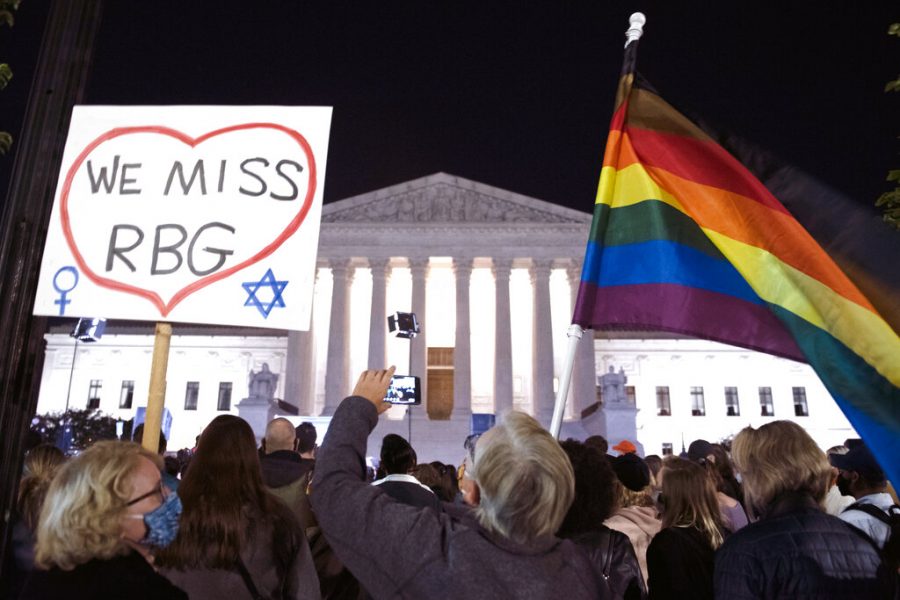





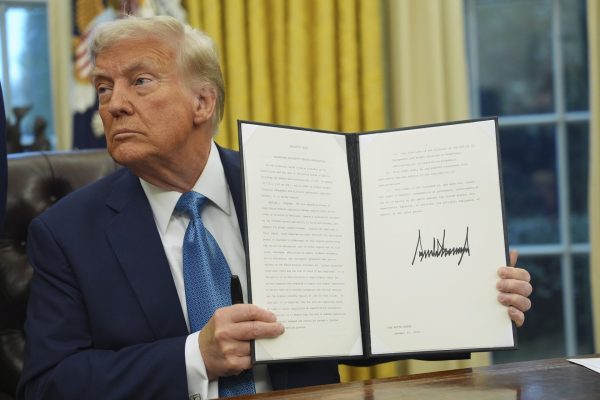
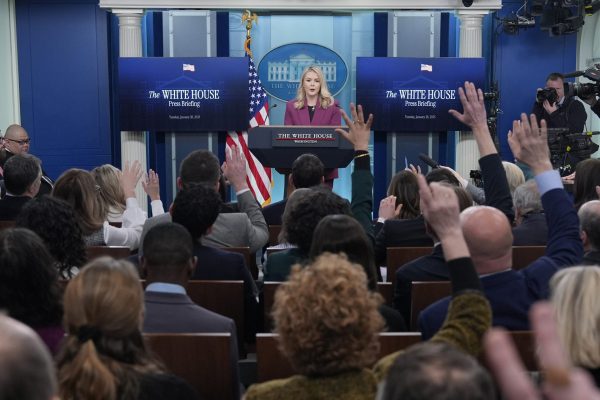
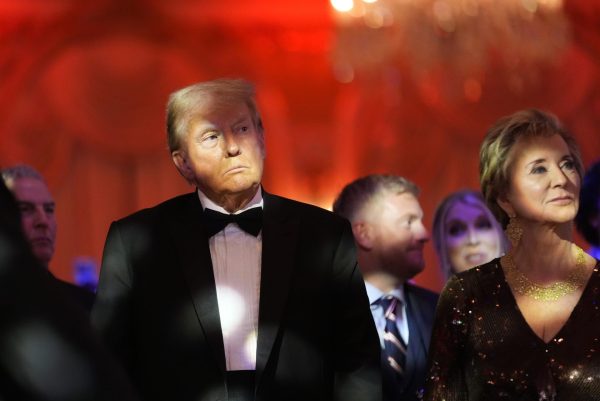
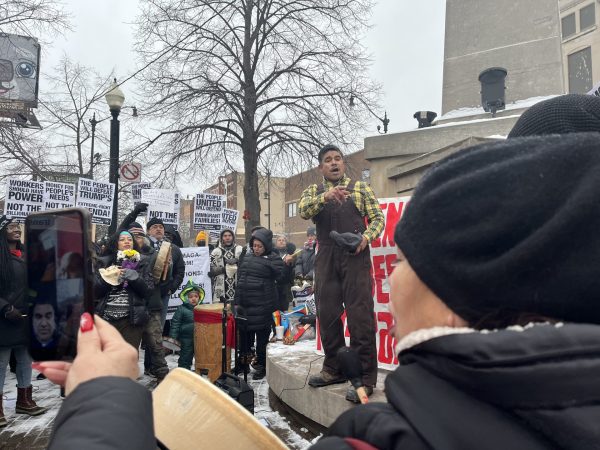
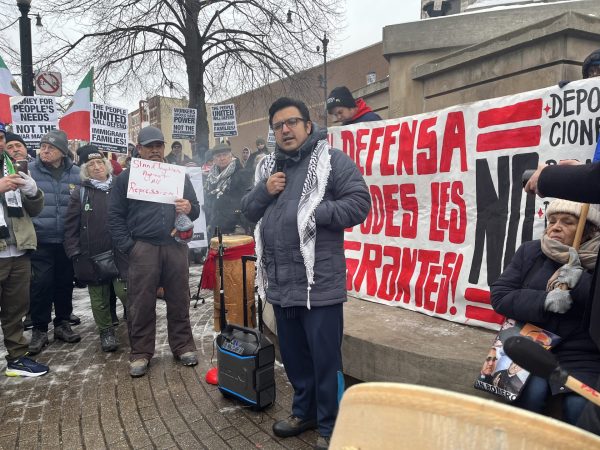
Craig / Sep 21, 2020 at 3:13 pm
Hopefully democrats can prevent the senate from voting on another Trump nominee.